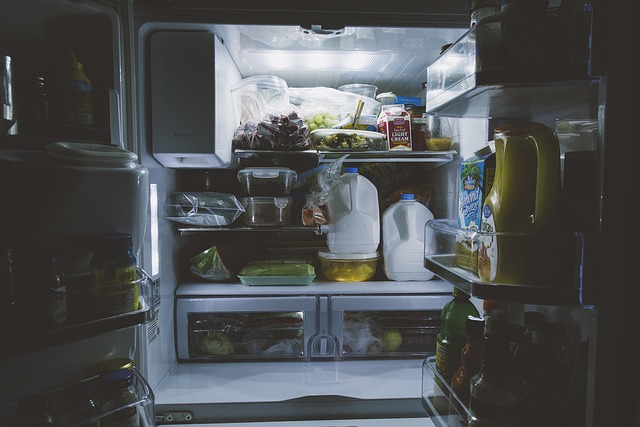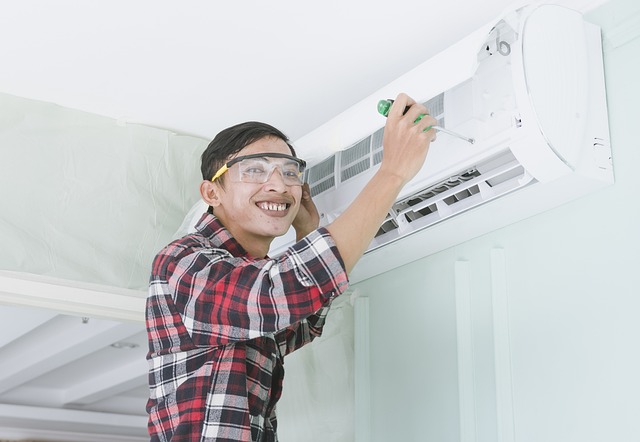Before opting for a new refrigerator, it's beneficial to evaluate the performance of your current unit and consider repair as a cost-effective and sustainable alternative, especially for older, though historically efficient models. Regular maintenance, such as cleaning condenser coils and monitoring for signs of malfunction, can significantly improve energy efficiency and extend the lifespan of your appliance. Refrigerator repair services can restore performance by addressing issues like faulty door seals or compressor parts, leading to notable energy savings and reducing your carbon footprint and utility bills. Upgrading components like door seals and thermistors, or opting for an Energy Star certified model with advanced insulation and cooling technology, can further enhance energy efficiency and result in long-term financial savings. The investment in a new, energy-efficient refrigerator is justified by the substantial savings on energy bills over time, making it a strategic choice for environmentally conscious consumers and those looking to reduce expenses without compromising on functionality. Regular upkeep and timely repairs are essential for maintaining optimal efficiency and ensuring your refrigerator operates at its best.
savvy homeowners and businesses are increasingly turning to energy-efficient components as a cost-saving measure. Among these, refrigerators are both a staple in daily life and a significant energy user. This article dissects the lucrative investment of opting for refrigerator repair over replacement for improved energy efficiency. It guides readers through maintaining and repairing their units to enhance performance and longevity. We’ll explore top energy-saving components that can be retrofitted into existing models, providing insights into a cost-benefit analysis that underscores the long-term savings achievable from upgrading refrigerator efficiency.
- Evaluating Energy Efficiency: The Case for Refrigerator Repair Over Replacement
- Step-by-Step Guide to Energy-Efficient Refrigerator Maintenance and Repairs
- Top Energy-Saving Components to Consider for Your Refrigerator
- Cost-Benefit Analysis: Long-Term Savings from Energy-Efficient Refrigerator Upgrades
Evaluating Energy Efficiency: The Case for Refrigerator Repair Over Replacement

When considering the installation of energy-efficient components, evaluating the performance of existing appliances such as refrigerators is crucial for cost savings and environmental sustainability. Rather than outright replacement, opting for refrigerator repair can be a more economical and eco-friendly choice. Older models, even when efficient by historical standards, often fall short in comparison to modern energy-saving designs. However, with professional repair services, these units can frequently be restored to optimal performance levels, significantly extending their operational lifespan. By addressing minor issues that cause inefficiencies, such as faulty door seals or worn-out compressor parts, refrigerator repair can lead to substantial energy savings. This not only reduces the carbon footprint but also minimizes expenses on utility bills, making it a compelling option for homeowners and businesses alike who are looking to cut costs without compromising on the essential function of their refrigerators. Regular maintenance and timely repairs can ensure that your refrigerator operates as efficiently as possible, prolonging its serviceable life and keeping energy consumption at a minimum. Thus, before deciding on a replacement, it’s advisable to assess the repairability and potential for energy efficiency improvements of your current unit.
Step-by-Step Guide to Energy-Efficient Refrigerator Maintenance and Repairs

Regular maintenance of your energy-efficient refrigerator is key to prolonging its lifespan and optimizing its performance for cost savings. Begin with a thorough cleaning routine, as dust and debris can impair its efficiency. Use a soft cloth to gently wipe down the exterior and ensure the condenser coils at the back or bottom are free of accumulated dirt. This simple step can improve cooling effectiveness and reduce energy consumption.
For repairs, be vigilant about monitoring signs such as unusual noise, inadequate cooling, or increased energy bills, which may indicate a problem that needs professional attention. If your refrigerator is leaking water, check the defrost drain and clear any blockages. For more complex issues like faulty seals or compressor malfunctions, consult a certified technician skilled in refrigerator repair to avoid further damage. Timely repairs and consistent maintenance not only enhance energy efficiency but also contribute to a stable indoor climate, ensuring your food remains fresh while keeping operational costs low.
Top Energy-Saving Components to Consider for Your Refrigerator

When looking to enhance your refrigerator’s energy efficiency, certain components stand out as top priorities for replacement or upgrade. A reliable refrigerator repair service can assist in identifying and installing these parts, which are key to optimizing your appliance’s performance and reducing your energy bills. For instance, the door seals play a critical role in maintaining the cold temperature within the fridge by preventing warm air from entering. Over time, seals can degrade, leading to less efficient operation. By replacing old or damaged door gaskets with new, high-quality ones, you can significantly improve your refrigerator’s ability to retain cold air, thereby saving energy and minimizing wear on the appliance.
Another important component to consider is the thermistor. This sensor measures the internal temperature of the refrigerator and adjusts the cooling cycle accordingly. A malfunctioning or miscalibrated thermistor can lead to unnecessary and costly energy use, as it may cause the fridge to run longer than necessary. Ensuring that this component is accurate and functioning correctly through a professional refrigerator repair service can result in substantial energy savings over time. Additionally, upgrading to an energy-efficient model with modern insulation and smarter cooling technologies, such as those with Energy Star certification, can further enhance your savings and reduce your carbon footprint. Always consult with experienced technicians for the best advice on how to proceed with these updates.
Cost-Benefit Analysis: Long-Term Savings from Energy-Efficient Refrigerator Upgrades

Upgrading to energy-efficient refrigerators presents a compelling opportunity for significant long-term savings on utility bills. A cost-benefit analysis reveals that while the initial investment for new, energy-efficient models may be higher compared to refrigerator repair of existing units, the cumulative energy savings over time far outweighs this upfront cost. Homeowners and businesses alike can anticipate reduced electricity consumption as these advanced refrigerators are engineered with cutting-edge technology that minimizes energy use without compromising performance. Furthermore, the longevity of energy-efficient refrigerators often means less frequent repairs in the long run, which contributes to the overall cost-effectiveness of the upgrade. By considering the long-term financial implications and environmental benefits, investing in energy-efficient refrigerators becomes a prudent decision for any household or commercial establishment aiming to curtail costs and promote sustainability.
In conclusion, the proactive maintenance and repair of refrigerators through energy-efficient components can yield substantial cost savings over time. By evaluating the energy efficiency of your current model against the potential savings from repairs or upgrades, as detailed in ‘Evaluating Energy Efficiency: The Case for Refrigerator Repair Over Replacement,’ homeowners can make informed decisions that align with their budget and environmental responsibilities. The ‘Step-by-Step Guide to Energy-Efficient Refrigerator Maintenance and Repairs’ provides actionable advice for extending the life of your refrigerator, while ‘Top Energy-Saving Components to Consider for Your Refrigerator’ highlights specific upgrades that can enhance efficiency. The cost-benefit analysis in ‘Cost-Benefit Analysis: Long-Term Savings from Energy-Efficient Refrigerator Upgrades’ underscores the long-term financial advantages of investing in energy-efficient refrigerator components, making a compelling case for refrigerator repair as a key strategy for cost reduction and sustainable living. Homeowners are encouraged to consider these insights when addressing their refrigerator needs.
